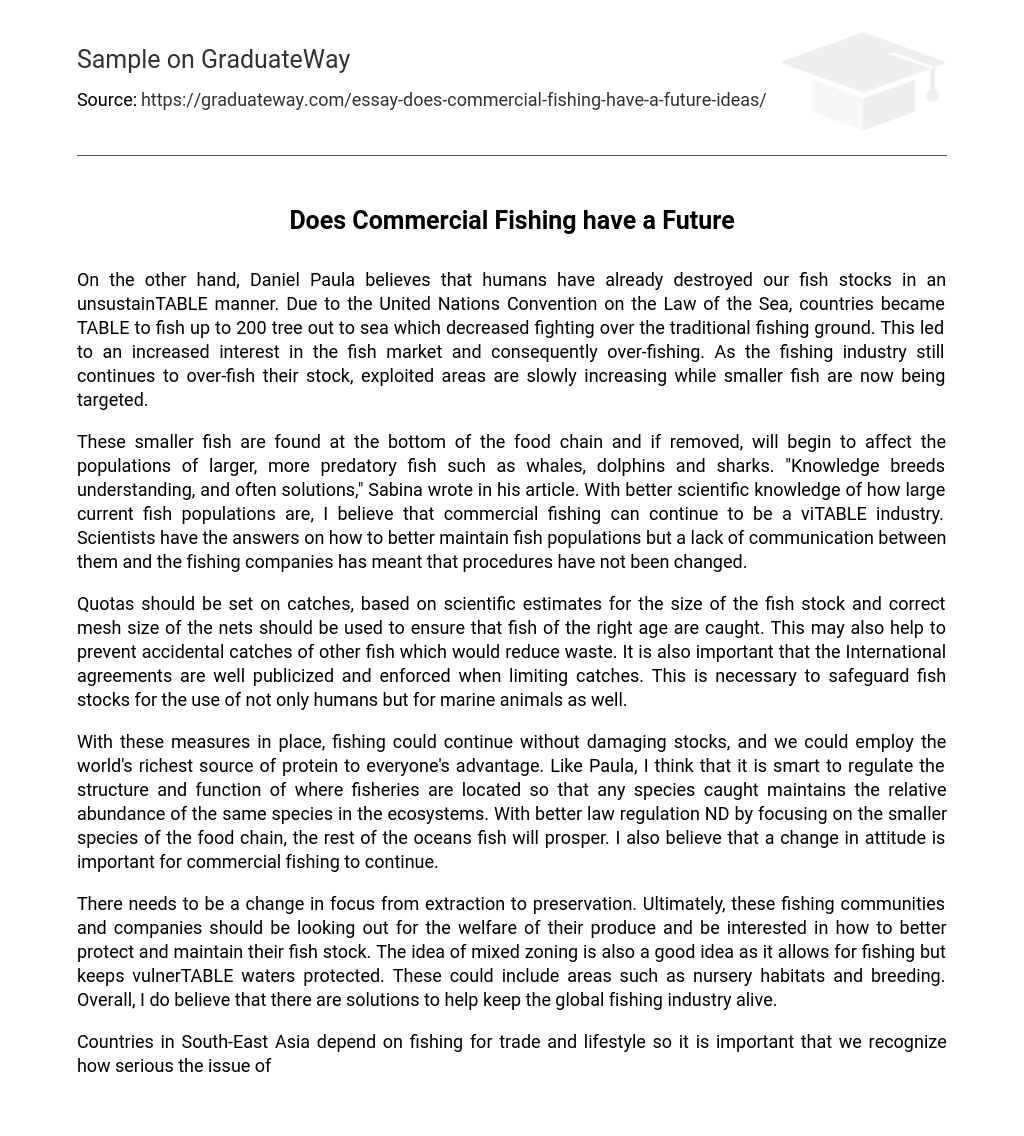On the other hand, Daniel Paula believes that humans have already destroyed our fish stocks in an unsustainTABLE manner. Due to the United Nations Convention on the Law of the Sea, countries became TABLE to fish up to 200 tree out to sea which decreased fighting over the traditional fishing ground. This led to an increased interest in the fish market and consequently over-fishing. As the fishing industry still continues to over-fish their stock, exploited areas are slowly increasing while smaller fish are now being targeted.
These smaller fish are found at the bottom of the food chain and if removed, will begin to affect the populations of larger, more predatory fish such as whales, dolphins and sharks. “Knowledge breeds understanding, and often solutions,” Sabina wrote in his article. With better scientific knowledge of how large current fish populations are, I believe that commercial fishing can continue to be a viTABLE industry. Scientists have the answers on how to better maintain fish populations but a lack of communication between them and the fishing companies has meant that procedures have not been changed.
Quotas should be set on catches, based on scientific estimates for the size of the fish stock and correct mesh size of the nets should be used to ensure that fish of the right age are caught. This may also help to prevent accidental catches of other fish which would reduce waste. It is also important that the International agreements are well publicized and enforced when limiting catches. This is necessary to safeguard fish stocks for the use of not only humans but for marine animals as well.
With these measures in place, fishing could continue without damaging stocks, and we could employ the world’s richest source of protein to everyone’s advantage. Like Paula, I think that it is smart to regulate the structure and function of where fisheries are located so that any species caught maintains the relative abundance of the same species in the ecosystems. With better law regulation ND by focusing on the smaller species of the food chain, the rest of the oceans fish will prosper. I also believe that a change in attitude is important for commercial fishing to continue.
There needs to be a change in focus from extraction to preservation. Ultimately, these fishing communities and companies should be looking out for the welfare of their produce and be interested in how to better protect and maintain their fish stock. The idea of mixed zoning is also a good idea as it allows for fishing but keeps vulnerTABLE waters protected. These could include areas such as nursery habitats and breeding. Overall, I do believe that there are solutions to help keep the global fishing industry alive.
Countries in South-East Asia depend on fishing for trade and lifestyle so it is important that we recognize how serious the issue of over- fishing is and aim to work with scientists and the marine industry. However, I think that there should be serious preventative measures put in place until certain fish stocks have recovered and repopulated themselves. One major point of controversy that we talked about was what if the loss of large and vulnerTABLE species does not recover even with protective measures put in place.
With our seas becoming more acidic in pH, the increase of pollution and then species being over-fished, it is becoming more difficult to keep populations at a sTABLE level. One solution proposed in the paper by Paula was to abolish government subsidies as large fishing corporations are attempting to monopolize the industry and over-fish our oceans. However, for smaller, private fishing businesses, this is not such a favorTABLE option. In class we discussed that a combination of updated and stricter equipment regulations would benefit the fish and that offering monetary incentives to update operations would be a DOD idea.
With the introduction of modern radar technology it has become a lot easier for trawler boats to locate and fish, thus making fishing a much more successful business. This has caused problems in Peru with a small fish called anchovies whose populations collapsed when breeding stock dwindled significantly (Peoples Trust for the Environment). Then off the East coast of England, overfeeding caused the annual catch of herring to fall 30-fold in only 15 years. Further north, a ban was placed on the fishing of herring, and in 1977, a complete ban was placed on herring fishing, throughout the North
Sea which lasted for six years. Overfeeding can seriously affect not only the fish stocks, but also the livelihoods of many people who depend on fishing as a job. There is a balance to be struck between catching large numbers of fish so as to make more money yet also ensuring that there are enough fish left alive to be TABLE to replenish stocks for future years. The temptation to make as much money as possible must be weighed against the economic hardship that whole communities may suffer as a result of overexploitation fisheries, not to mention the consequences of overfeeding for fish populations.





